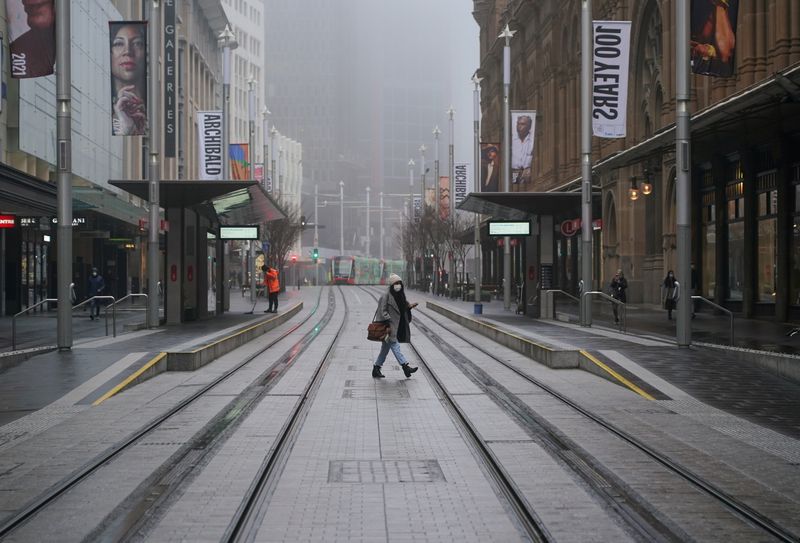By Swati Pandey
SYDNEY (Reuters) - Fresh COVID-19 outbreaks in Australia and a snail-paced vaccination rollout are starting to take the shine off the country's stunning economic recovery, souring the business mood and casting doubts over its path to post-pandemic life.
Sydney, Australia's largest city, this week entered its strictest lockdown since the pandemic began as the Delta variant of the virus spread out from the beach suburb of Bondi. Partial curbs were imposed across other major cities, limiting movement for 80% of the nation's population.
The mobility restrictions come amid mounting concerns about the sluggish and dysfunctional vaccination rollout in Australia, which currently has one of the lowest COVID-19 inoculation rates in the developed world at just 8% of the adult population.
The new challenges are starting to irk investors and businesses. Expectations are growing that policymakers will need to maintain current emergency levels of support for the economy rather than paring it back, pushing the Australian dollar to a six-month trough despite solid data on jobs, trade and credit growth this week.
"Covid remains a concern and a headwind for the Aussie," said Rodrigo Catril, senior forex strategist at National Australia Bank (OTC:NABZY).
The currency hit a three-year high in February, led by Australia's economic strength and success in curbing the pandemic, prompting investors to price-in interest rate hikes from late 2022.
But some economists are now predicting a dovish tilt by the country's central bank at its monthly policy meeting next Tuesday, with the current Sydney lockdown expected to shave 0.1% off annual output.
Economists in a Reuters poll this week forecast the Reserve Bank of Australia (RBA) would choose to not extend its three-year yield target of 0.1% to November 2024, from April 2024 now, driven by stronger-than-expected economic data. [AU/INT]
"Though clearly the risk headed into the meeting...is that the Delta variant brings out the doves, and the RBA opt to roll to the November 2024 bond," said Eleanor Creagh, market strategist at Saxo Capital Markets.
Shane Oliver, chief economist for Australian fund manager AMP (OTC:AMLTF), expects a third round of RBA quantitative easing at A$75 billion, higher than his previous expectation of A$50 billion. Most other economists have predicted a "flexible" setting.
The RBA's bond buying programme has pushed borrowing costs to all-time lows as the government ran up record budget deficits for its massive fiscal stimulus programmes.
In a sign of the enduring after-effects of the pandemic, the government's own projections show deficits out to 2060/61 compared to ambitious forecasts for surpluses in 2019, begging the need for strong productivity growth.
LACK OF VISION
Businesses are also frustrated, not just with the on-again, off-again lockdowns across the nation with just a handful of cases but the absence of a clear roadmap out of the pandemic.
Companies, led by Australia's largest employers' association, have been clamouring for borders to reopen.
"You look overseas and, of course, you are seeing Europe opening up but for some reason we are not in a hurry," said Simon Bernardi, managing director at tour operator Australia & Beyond Holidays.
Bernardi says he lost "hundreds of thousands of dollars" due to the latest state border closures and stay-at-home orders.
"Unfortunately it's driven by politics because it's easy for people to win elections if they lock everyone down," he added.
Drowning out the business case for reopening is the political reality that closed borders and a conservative approach win votes in Australia, as seen in two state elections recently.
Treasury estimates assume a reopening in mid-2022, though Prime Minister Scott Morrison, with an eye on an election some time in the year ahead, has refused to commit to a timeline.
Facing scathing criticism from all quarters, Morrison on Friday announced a vague roadmap out of the pandemic where lockdowns would be used as a "last resort". Yet, still absent was any firm timeframe for international borders to fully reopen.

Australia & Beyond's Bernardi thinks the damage is already done, with the effects set to be long-lasting.
"These lockdowns will impact us going forward too because people just aren't confident to book anymore. That's been a big challenge and it's been pretty miserable for this industry," he said.